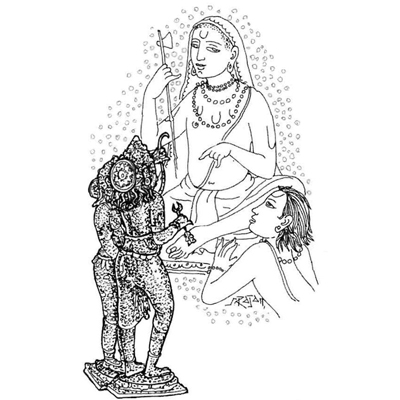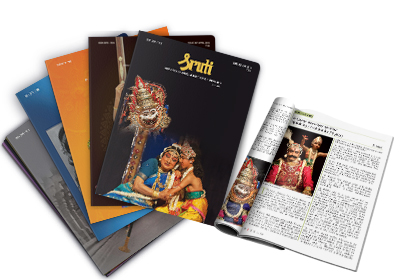
"Yippee," shouted Sargam as she whirled into the house and in the process stamped on her dog's tail. Thunder yelped looked up crossly but decided to pardon her this time around. And, what was all this excitement about? Amma walked into the room, tripped over Sargam's bulging schoolbag and balanced herself by holding on to the wall. "One of these days, I am going to fall and break my bones," shouted she in an agitated voice, simultaneously pushing the sack aside. "Sorry, Amma," said Sargam and secretly smiled to herself, amused at the thought of her not so thin mother falling down.
"I wish I knew what you are smiling at, especially when I am in pain. Anyway, tell me what all this excitement is about?" Amma repeated her question. "We as a class are going on an excursion to Mysore for the Dussera festival... tra-la-la-la," replied Sargam, doing a little jig at the same time. "But there is a sad side to the whole deal," she added, with a mock woebegone expression on her face. "Cut short all this drama and come to the point," said Amma. "Amma, when we get back, all of us are supposed to write an essay on some aspect of Karnataka's history and that is the...." Before Sargam could complete the lament, Amma chirped as she placed Sargam's evening meal on the table: "See Sargam, history is nothing but His Story and I will tell you not only "his story' but "their story' also— the story of the Haridasa-s of Karnataka," said Amma, Sargam happily settled down for a nice story-filled evening. "Haridasa means Servant of Hari. Dasa is a servant and Hari is one of Vishnu's names. There were many dasa-s and let me start their story at the beginning," began Amma.
"These servants of Hari were followers of a religious leader of Kannada desa called Madhvacharya. They were collectively called the Dasakoota. Koota means a collection of people. As a first step to becoming a Haridasa, the aspirant had to take a number of vows. He had to have total faith in the Vedas and other ancient Hindu texts. He should not borrow money from anybody, never complain about his plight and always be content. There were other conditions too, but the most important one was that he should constantly meditate on Lord Vishnu." "Gosh, they must really be fond of Vishnu to take such vows," Sargam thought. She would have been happy with a little more salt in her food but decided that she would be "content' with her lot. Amma continued: "All those who were admitted into the Dasakoota had a guru who gave each of them a new name." "Why a new name, Amma?" Sargam asked, wondering whether she could also have another name. Her name was a little unusual and....Amma's voice cut into her train of thoughts. "Sanyasi-s, after they take their vows, begin a new life very different from the ones they led earlier. Sooo," Amma stressed the "o', "they take new names to signify their new birth as dasa-s.""Ah, just like Narendranath became Swami Vivekananda," Sargam remarked, brightening up. "Exactly," confirmed Amma and continued. "The "ankita' or name-signatures which are mentioned in the songs are now the identifying marks of the dasa-s because most of them did not write down their compositions which have come down to us orally. As the dasas were devotees of Vithala of Pandharpur, this name was also usually added to their signature in the songs. "The dasa-s were householders who had not renounced their family, but they led a life of great restraint and piety." "But Amma," whined Sargam, "you haven't started the story yet." "Have some patience, Sargam, if I don't tell you all this, you won't understand anything about the dasas."
Amma began: "The earliest of the dasa-s was Narahari Teertha. His original name was Swami Sastri or Shama Sastri, I am not sure. He was an officer— daftardar— in the court of the King of Orissa. Once, Madhvacharya visited the court of this king. He chanced to see two very beautiful idols of Rama and Seeta at the palace and instantly expressed his deep desire to worship those idols. It so happened that when Swami Sastri retired from service, these very idols of Rama and Seeta were presented to him by the king. He, in turn, was only very happy to present them to Madhvacharya. He also became a dasa and was renamed Narahari Teertha by Madhvacharya, his spiritual mentor. The story also goes that, after the death of the incumbent king, Narahari Teertha even served as ruler of Orissa till such time the crown prince came of age. Do you know, Sargam, those idols are still worshipped at a Vaishnava mutt called Uttaradi Math?
"Narahari Teertha composed songs in Kannada in praise of the Lord but only a few of them are available with us today. He used a pen-name. I think it was Sree Raghupati. No other information on this dasa is available to us. By the way, I must tell you that not all scholars accept Narahari Teertha as the founder of the Dasakoota. A 100 or 150 years later came another dasa and most scholars believe that it is this savant who can correctly be called the founder of the dasa movement. "In the early part of the 15th century, at Abburu, near Channapattinam which is 80 km from Mysore city, lived a boy called Lakshminarayana. His parents were Seshagiri Acharya and Giriamma. They were very poor. Some say that they lived at a place called Mulubagilu in the Kolar district. At an early age, Lakshminarayana was entrusted to a swami called Swarnavarna Teertha, who was also the head of a mutt at Srirangam in Tamil Nadu. At that time, the mutt-s were excellent sources of education that functioned like schools and colleges. Lakshminarayana later became the famous dasa called Sripadaraja. He composed many songs in Kannada. They were required to be sung in the mutt everyday during the time of pooja. So, it can be said he was the one who introduced the local language Kannada in the mutt. He was a musical genius and composed many types of songs called sooladi-s, ugabhoga-s, vrittanama and dandaka, to name a few. Almost 80 songs of his have come down to us. Sripadaraja was such a great scholar that Saluva Narasimharaya, the King of Chandragiri, is said to have honoured him in the year 1497 AD. He also received many gifts from the kings of Vijayanagara and Chandragiri. He used Ranga Vithala and Sree Ranga as his pen-name or pseudonym. "Sripadaraja lived for a fairly long time. He had an outstanding disciple who later on became a great teacher as well." "God, he must have been a really great man to have been honoured by kings," exclaimed Sargam. "Reserve some of your compliments for the next hero in my story," said Amma, and proceeded to narrate the story of Vyasaraya. "Vyasaraya (1447-1539) was born in Bannur on the banks of the river Kaveri in Mysore. As soon as he was born, he was put on a golden plate and entrusted to a sage called Brahmanya Teertha. Later on he was initiated by Sripadaraja. "Vyasaraya was the spiritual guru of three of the Raya kings of Vijayanagara: Narasimha Raya, Veera Narasimha Raya and Krishnadeva Raya. In fact, to save Krishnadeva Raya from the evil effects of certain planetary positions, Vyasaraya occupied the royal throne for a few years on his behalf. You know, a remarkable point about these dasa-s was that, although some of them lived in the royal court with all its pomp and wealth, they remained ascetics at heart. "Vyasaraya, who became head of a mutt in 1467, had a galaxy of brilliant and famous disciples like Purandaradasa, Kanakadasa, Vadiraja and others. I will tell you their life-stories later. Vyasaraya was a musical genius. Not only did scholars and others of his time praise him, even those who came later acknowledged his musical competence. King Tulaja of Tanjavur, in the early 18th century, compared Vyasaraya to Brahma in one of his musical compositions. Vyasaraya's mutt at Hampi was like a university. Vyasaraya was a great Sanskrit scholar and composed many literary works in Sanskrit. He also composed many delightful songs in simple Kannada. He signed his name as Sree Krishna, he composed more than 100 songs. He did away with the prejudices of caste and creed. One of his disciples belonged to a low caste and later on became famous as Kanakadasa. "Krishna Chaitanya, also known as Gauranga of Bengal, is said to have been a disciple of Vyasaraya. Even to this day, the followers of Chaitanya consider themselves as followers of the Vyasaraya Math. Vyasaraya died in 1539; his samadhi is situated in Anegondi, near Hampi in Karnataka. "One of the later dasa-s called Vijayadasa has given an interesting lifesketch of Vyasaraya in one of his songs. "I told you that Vyasaraya had a number of disciples. I will now tell you the story of one of them."Vadiraja (1480-1600 AD) was born in Hoovinakere near Kumbhasi, Kundapur taluk in Dakshina Kannada district. Even before his birth, his parents promised they would present him to Swami Vidyateertha of the Svadi Mutt, to be brought up as his disciple and heir. Young Varaha, as he was known, was initiated into the sanyasa order in his eighth year with the asrama name of Vadiraja. Approximately 200 songs are available with his signature— Hayavadana. These include some of the song-forms mentioned earlier like sooladi-s, ugabhoga-s and pada-s, as well as songs with folk tunes. "You know, Sargam, he was an experimenter and a unique music composer." "In what way was he unique Amma? Did he compose songs of the Michael Jackson type?" So queried Sargam tongue-in-cheek, contorting her body like the superstar. "No, he composed songs like A.R. Rahman," replied Amma, joining the banter sportively. "Vadiraja composed unique and lengthy songs. One of these songs describes Vaikuntha, which, as you know, is the abode of Lord Vishnu. He composed suwali-s, which are like folk songs sung by women when they pound grain. The songs got their name from the words suwi and suwaley which are sung at the end of each line or stanza of the song. Three such songs of his are available today. In another song called Lakshmi sobhaney, he narrates the wedding of Goddess Lakshmi with Narayana. Even today, this song is sung at weddings in Karnataka. In this song many musical instruments of yore have been mentioned like the bheri, dundhubi, maddaley, paraha and sankha. "Vadiraja also composed swapnapada, which means dream song, in which Lord Narayana supposedly revealed his commandments to Vadiraja in a dream. This song talks about the glories of Vishnu, his 10 avatara-s (dasavatara), how the Lord fulfills the desires of his devotees and other related matters. Another long song is the Gajendra moksha." "Adimoolamey...," exclaimed Sargam in a plaintive tone, as she visualised the story of the elephant saved from the crocodile by Lord Vishnu. "Good theatrics," responded Amma and Sargam wondered if this was a compliment or Amma at her sarcastic best. "Vadiraja also composed a folk dance-drama in Kannada, which he titled as Narada Koravanji. Here sage Narada plays the role of the kuravanji or gypsy to Rukmini who was yearning to marry Krishna. It is a beautiful composition and I do wish somebody dances to it on stage. Like Sripadaraja, Vadiraja also composed other songs on the Krishna theme. "Vadiraja also composed lullabies, arati songs, mangalam-s (benediction)...." "Wow," exclaimed Sargam, "he must have been a marvellous composer." "You know Sargam, as a disciple of Vyasaraya, Vadiraja studied all branches of philosophy. He was also learned in politics and other sciences. He soon obtained recognition and Emperor Krishnadcvaraya conferred on him the title of Prasangabharana Teertha. He travelled extensively all over India, spreading the teachings of Madhvacharya. "There are many stories current about Vadiraja's superhuman powers. Later dasa-s like Jagannathadasa and several others have composed many songs paying tribute to him. He was the longest serving pontiff of the Madhva mutt-s and it is said he lived for 120 years." "The works of the Haridasa-s are a beautiful combination of music and poetry. They also tell you what is good and what is bad for mankind." Amma paused and looked at the clock on the wall.
"Aren't you going to tell me the story of Purandaradasa and Kanakadasa now?", asked Sargam putting on a sad expression, this time for real though! She was also secretly proud that she remembered the names of these dasa-s and hoped that Amma would notice it. "Great that you remember their names but I am going to reserve those stories for another day. There are other things to be done too today, no?" "Of course, of course," said Sargam as she got up from the chair. She remembered the homework lying unfinished in her bag. Thunder wagged his tail and also seemed to agree that it was time to get up; indeed, it was time for his evening meal and walk and Sargam gave him a loving pat. He participated in all these story sessions as though he understood them. She chuckled as she thought: "Maybe he identifies raga-s too! Who knows!"


